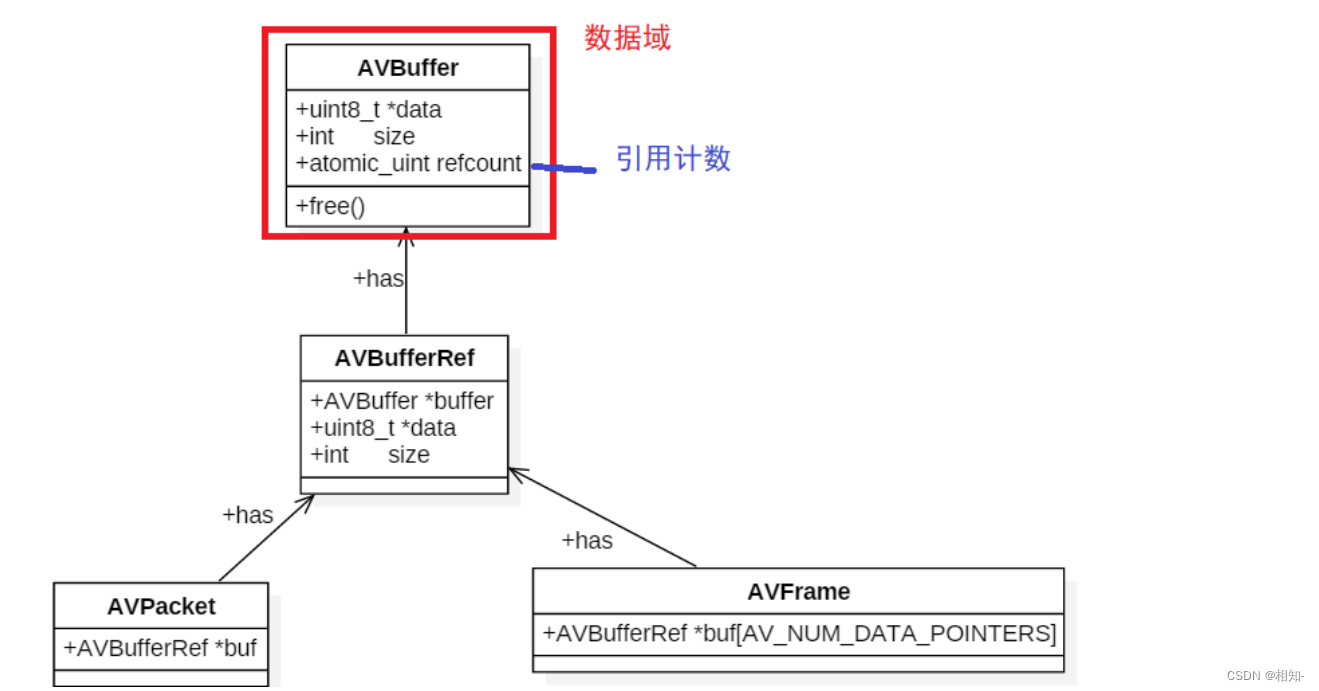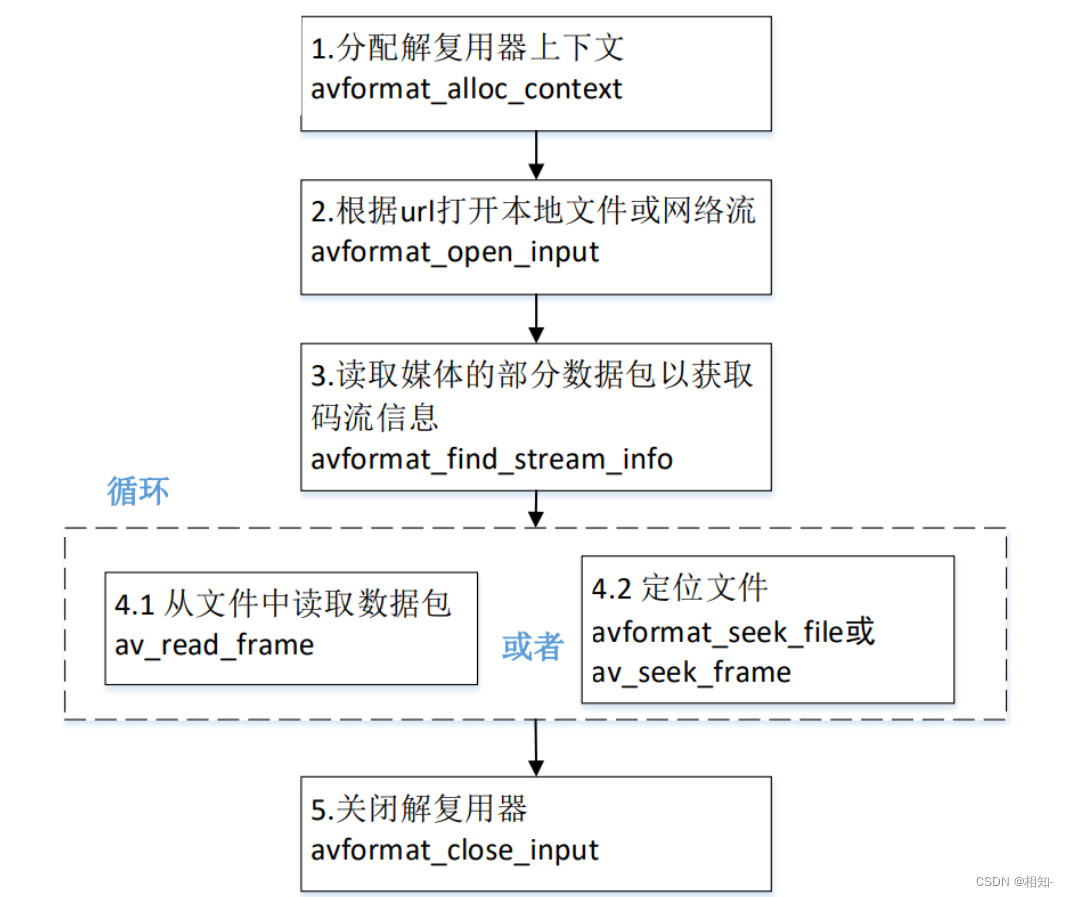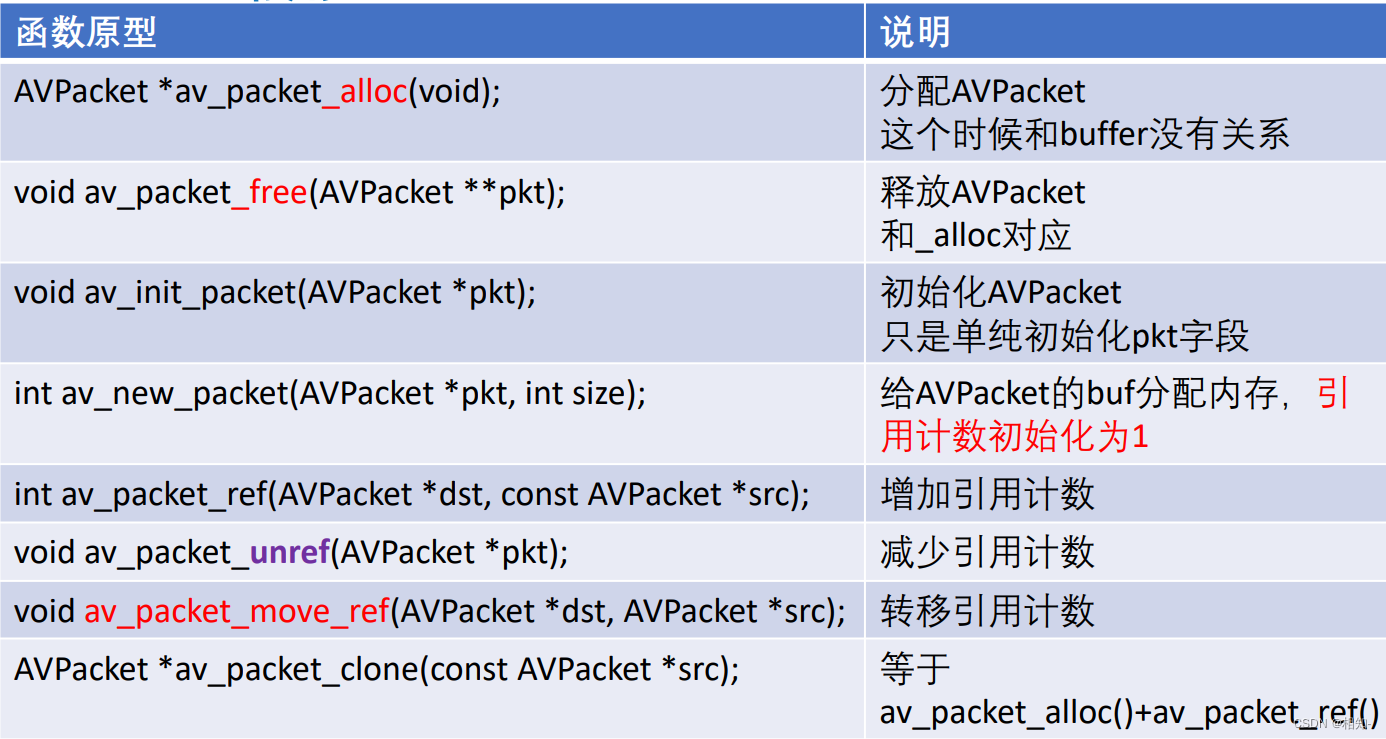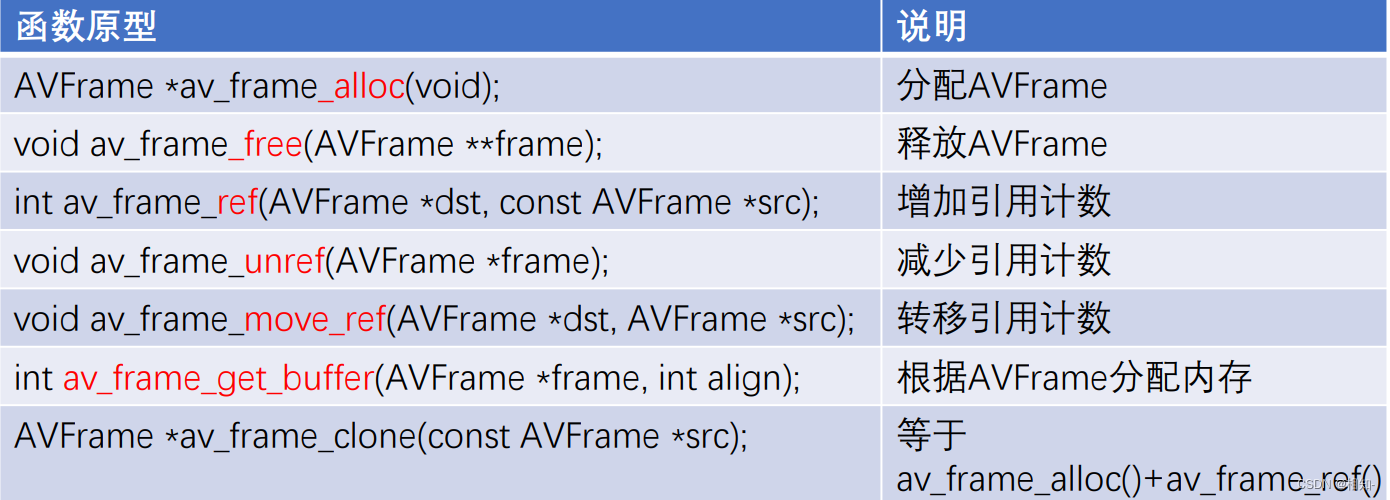title
1. Memory model diagram

2. Analysis process
After we demultiplex, the media stream data will be separated, the corresponding AVPacketList will be generated respectively, and then an AVPacket will be read through av_read_frame. However, if there is a new AVPacket that also wants to point to the previous AVPacket, then the memory model What should it look like?
After thinking, there should be two models:
1. Two AVPackets point to the same data area at the same time.
2. Copy the previous data area first, and then use it for the new AVPacket.

Since our data area is read-only, we can adopt the first solution which is more secure, but a new problem arises. If our avpacket releases the data, the data will disappear, and avpacket2 will become invalid. Then the How to solve it?
If any friends have understood the smart pointer design of C++, then they will know how to design this situation.
We introduce a variable to mark how many AVPackets the data is used, and when the variable is 1, it is released. Will actually release the modified data.

3. Trace back to the source——source code analysis
3.1 When was the AVPacket queue generated?

Let's take a look at the above process first.
Let's read the avformat_open_input function carefully.
int avformat_open_input(AVFormatContext **ps, const char *filename,
ff_const59 AVInputFormat *fmt, AVDictionary **options)
{
AVFormatContext *s = *ps;
int i, ret = 0;
AVDictionary *tmp = NULL;
ID3v2ExtraMeta *id3v2_extra_meta = NULL;
if (!s && !(s = avformat_alloc_context()))
return AVERROR(ENOMEM);
if (!s->av_class) {
av_log(NULL, AV_LOG_ERROR, "Input context has not been properly allocated by avformat_alloc_context() and is not NULL either\n");
return AVERROR(EINVAL);
}
if (fmt)
s->iformat = fmt;
if (options)
av_dict_copy(&tmp, *options, 0);
if (s->pb) // must be before any goto fail
s->flags |= AVFMT_FLAG_CUSTOM_IO;
if ((ret = av_opt_set_dict(s, &tmp)) < 0)
goto fail;
if (!(s->url = av_strdup(filename ? filename : ""))) {
ret = AVERROR(ENOMEM);
goto fail;
}
#if FF_API_FORMAT_FILENAME
FF_DISABLE_DEPRECATION_WARNINGS
av_strlcpy(s->filename, filename ? filename : "", sizeof(s->filename));
FF_ENABLE_DEPRECATION_WARNINGS
#endif
if ((ret = init_input(s, filename, &tmp)) < 0)
goto fail;
s->probe_score = ret;
if (!s->protocol_whitelist && s->pb && s->pb->protocol_whitelist) {
s->protocol_whitelist = av_strdup(s->pb->protocol_whitelist);
if (!s->protocol_whitelist) {
ret = AVERROR(ENOMEM);
goto fail;
}
}
if (!s->protocol_blacklist && s->pb && s->pb->protocol_blacklist) {
s->protocol_blacklist = av_strdup(s->pb->protocol_blacklist);
if (!s->protocol_blacklist) {
ret = AVERROR(ENOMEM);
goto fail;
}
}
if (s->format_whitelist && av_match_list(s->iformat->name, s->format_whitelist, ',') <= 0) {
av_log(s, AV_LOG_ERROR, "Format not on whitelist \'%s\'\n", s->format_whitelist);
ret = AVERROR(EINVAL);
goto fail;
}
avio_skip(s->pb, s->skip_initial_bytes);
/* Check filename in case an image number is expected. */
if (s->iformat->flags & AVFMT_NEEDNUMBER) {
if (!av_filename_number_test(filename)) {
ret = AVERROR(EINVAL);
goto fail;
}
}
s->duration = s->start_time = AV_NOPTS_VALUE;
/* Allocate private data. */
if (s->iformat->priv_data_size > 0) {
if (!(s->priv_data = av_mallocz(s->iformat->priv_data_size))) {
ret = AVERROR(ENOMEM);
goto fail;
}
if (s->iformat->priv_class) {
*(const AVClass **) s->priv_data = s->iformat->priv_class;
av_opt_set_defaults(s->priv_data);
if ((ret = av_opt_set_dict(s->priv_data, &tmp)) < 0)
goto fail;
}
}
/* e.g. AVFMT_NOFILE formats will not have a AVIOContext */
if (s->pb)
ff_id3v2_read_dict(s->pb, &s->internal->id3v2_meta, ID3v2_DEFAULT_MAGIC, &id3v2_extra_meta);
if (!(s->flags&AVFMT_FLAG_PRIV_OPT) && s->iformat->read_header)
if ((ret = s->iformat->read_header(s)) < 0)
goto fail;
if (!s->metadata) {
s->metadata = s->internal->id3v2_meta;
s->internal->id3v2_meta = NULL;
} else if (s->internal->id3v2_meta) {
int level = AV_LOG_WARNING;
if (s->error_recognition & AV_EF_COMPLIANT)
level = AV_LOG_ERROR;
av_log(s, level, "Discarding ID3 tags because more suitable tags were found.\n");
av_dict_free(&s->internal->id3v2_meta);
if (s->error_recognition & AV_EF_EXPLODE) {
ret = AVERROR_INVALIDDATA;
goto close;
}
}
if (id3v2_extra_meta) {
if (!strcmp(s->iformat->name, "mp3") || !strcmp(s->iformat->name, "aac") ||
!strcmp(s->iformat->name, "tta") || !strcmp(s->iformat->name, "wav")) {
if ((ret = ff_id3v2_parse_apic(s, &id3v2_extra_meta)) < 0)
goto close;
if ((ret = ff_id3v2_parse_chapters(s, &id3v2_extra_meta)) < 0)
goto close;
if ((ret = ff_id3v2_parse_priv(s, &id3v2_extra_meta)) < 0)
goto close;
} else
av_log(s, AV_LOG_DEBUG, "demuxer does not support additional id3 data, skipping\n");
}
ff_id3v2_free_extra_meta(&id3v2_extra_meta);
if ((ret = avformat_queue_attached_pictures(s)) < 0)
goto close;
if (!(s->flags&AVFMT_FLAG_PRIV_OPT) && s->pb && !s->internal->data_offset)
s->internal->data_offset = avio_tell(s->pb);
s->internal->raw_packet_buffer_remaining_size = RAW_PACKET_BUFFER_SIZE;
update_stream_avctx(s);
for (i = 0; i < s->nb_streams; i++)
s->streams[i]->internal->orig_codec_id = s->streams[i]->codecpar->codec_id;
if (options) {
av_dict_free(options);
*options = tmp;
}
*ps = s;
return 0;
close:
if (s->iformat->read_close)
s->iformat->read_close(s);
fail:
ff_id3v2_free_extra_meta(&id3v2_extra_meta);
av_dict_free(&tmp);
if (s->pb && !(s->flags & AVFMT_FLAG_CUSTOM_IO))
avio_closep(&s->pb);
avformat_free_context(s);
*ps = NULL;
return ret;
}
The key ones are:
if ((ret = avformat_queue_attached_pictures(s)) < 0)
goto close;
avformat_open_input calls the avformat_queue_attached_pictures function, so let me see what this function does?
int avformat_queue_attached_pictures(AVFormatContext *s)
{
int i, ret;
for (i = 0; i < s->nb_streams; i++)
if (s->streams[i]->disposition & AV_DISPOSITION_ATTACHED_PIC &&
s->streams[i]->discard < AVDISCARD_ALL) {
if (s->streams[i]->attached_pic.size <= 0) {
av_log(s, AV_LOG_WARNING,
"Attached picture on stream %d has invalid size, "
"ignoring\n", i);
continue;
}
ret = ff_packet_list_put(&s->internal->raw_packet_buffer,
&s->internal->raw_packet_buffer_end,
&s->streams[i]->attached_pic,
FF_PACKETLIST_FLAG_REF_PACKET);
if (ret < 0)
return ret;
}
return 0;
}
From the function, it is obvious that this function calls ff_packet_list_put for each stream to build the AVPacketList linked list.
Let's take a closer look at the ff_packet_list_put function:
int ff_packet_list_put(AVPacketList **packet_buffer,
AVPacketList **plast_pktl,
AVPacket *pkt, int flags)
{
AVPacketList *pktl = av_mallocz(sizeof(AVPacketList));
int ret;
if (!pktl)
return AVERROR(ENOMEM);
if (flags & FF_PACKETLIST_FLAG_REF_PACKET) {
if ((ret = av_packet_ref(&pktl->pkt, pkt)) < 0) {
av_free(pktl);
return ret;
}
} else {
// TODO: Adapt callers in this file so the line below can use
// av_packet_move_ref() to effectively move the reference
// to the list.
pktl->pkt = *pkt;
}
if (*packet_buffer)
(*plast_pktl)->next = pktl;
else
*packet_buffer = pktl;
/* Add the packet in the buffered packet list. */
*plast_pktl = pktl;
return 0;
}
This function is actually a tail insertion function of a linked list. It creates an AVPacketList every time, and what is encapsulated in the AVPacketList structure is: AVPacket
typedef struct AVPacketList {
AVPacket pkt;
struct AVPacketList *next;
} AVPacketList;
So here we have answered the question in the title at the beginning.
4.AVPacket and AVFrame related operation API


5. av_read_frame source code analysis
int av_read_frame(AVFormatContext *s, AVPacket *pkt)
{
const int genpts = s->flags & AVFMT_FLAG_GENPTS;
int eof = 0;
int ret;
AVStream *st;
if (!genpts) {
ret = s->internal->packet_buffer
? ff_packet_list_get(&s->internal->packet_buffer,
&s->internal->packet_buffer_end, pkt)
: read_frame_internal(s, pkt);
if (ret < 0)
return ret;
goto return_packet;
}
for (;;) {
AVPacketList *pktl = s->internal->packet_buffer;
if (pktl) {
AVPacket *next_pkt = &pktl->pkt;
if (next_pkt->dts != AV_NOPTS_VALUE) {
int wrap_bits = s->streams[next_pkt->stream_index]->pts_wrap_bits;
// last dts seen for this stream. if any of packets following
// current one had no dts, we will set this to AV_NOPTS_VALUE.
int64_t last_dts = next_pkt->dts;
av_assert2(wrap_bits <= 64);
while (pktl && next_pkt->pts == AV_NOPTS_VALUE) {
if (pktl->pkt.stream_index == next_pkt->stream_index &&
av_compare_mod(next_pkt->dts, pktl->pkt.dts, 2ULL << (wrap_bits - 1)) < 0) {
if (av_compare_mod(pktl->pkt.pts, pktl->pkt.dts, 2ULL << (wrap_bits - 1))) {
// not B-frame
next_pkt->pts = pktl->pkt.dts;
}
if (last_dts != AV_NOPTS_VALUE) {
// Once last dts was set to AV_NOPTS_VALUE, we don't change it.
last_dts = pktl->pkt.dts;
}
}
pktl = pktl->next;
}
if (eof && next_pkt->pts == AV_NOPTS_VALUE && last_dts != AV_NOPTS_VALUE) {
// Fixing the last reference frame had none pts issue (For MXF etc).
// We only do this when
// 1. eof.
// 2. we are not able to resolve a pts value for current packet.
// 3. the packets for this stream at the end of the files had valid dts.
next_pkt->pts = last_dts + next_pkt->duration;
}
pktl = s->internal->packet_buffer;
}
/* read packet from packet buffer, if there is data */
st = s->streams[next_pkt->stream_index];
if (!(next_pkt->pts == AV_NOPTS_VALUE && st->discard < AVDISCARD_ALL &&
next_pkt->dts != AV_NOPTS_VALUE && !eof)) {
ret = ff_packet_list_get(&s->internal->packet_buffer,
&s->internal->packet_buffer_end, pkt);
goto return_packet;
}
}
ret = read_frame_internal(s, pkt);
if (ret < 0) {
if (pktl && ret != AVERROR(EAGAIN)) {
eof = 1;
continue;
} else
return ret;
}
ret = ff_packet_list_put(&s->internal->packet_buffer,
&s->internal->packet_buffer_end,
pkt, FF_PACKETLIST_FLAG_REF_PACKET);
av_packet_unref(pkt);
if (ret < 0)
return ret;
}
return_packet:
st = s->streams[pkt->stream_index];
if ((s->iformat->flags & AVFMT_GENERIC_INDEX) && pkt->flags & AV_PKT_FLAG_KEY) {
ff_reduce_index(s, st->index);
av_add_index_entry(st, pkt->pos, pkt->dts, 0, 0, AVINDEX_KEYFRAME);
}
if (is_relative(pkt->dts))
pkt->dts -= RELATIVE_TS_BASE;
if (is_relative(pkt->pts))
pkt->pts -= RELATIVE_TS_BASE;
return ret;
}
With the previous knowledge, it is not difficult to analyze that read_frame_internal calls ff_packet_list_put to obtain the AVPacket, but it should be noted here that ff_packet_list_put does not simply give the AVPacket to read_frame_internal.
int ff_packet_list_get(AVPacketList **pkt_buffer,
AVPacketList **pkt_buffer_end,
AVPacket *pkt)
{
AVPacketList *pktl;
av_assert0(*pkt_buffer);
pktl = *pkt_buffer;
*pkt = pktl->pkt;
*pkt_buffer = pktl->next;
if (!pktl->next)
*pkt_buffer_end = NULL;
av_freep(&pktl);
return 0;
}
According to the source code, it can be concluded that ff_packet_list_get first copies the original data directly to pkt through *pkt = pktl->pkt;, and then releases pkt1, which is a node on the AVPacketList linked list. Then an AVPacket will disappear from the linked list at this time. The advantage of this is that the AVPacket in the AVPacketList linked list will be slowly released, thereby reducing memory usage!
I will leave the detailed explanation of AVFrame related APIs until I introduce the encoding and decoding API process, so stay tuned ~